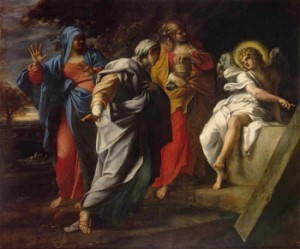As they led Jesus off, they made Simon, a man from Cyrene who happened to be coming in from the countryside, carry the cross behind Jesus. A huge crowd of people followed, along with women weeping and carrying on. At one point Jesus turned to the women and said, “Daughters of Jerusalem, don’t cry for me. Cry for yourselves and for your children.” — Luke 23:26-28 The Message
My mom lost her mother and her husband in three very sad weeks in 1961. I remember the family gathering at the old home in Baltimore, the subdued voices where normally there would be laughter and singing, the tears, the awkward silences hanging heavily over the room. There were whispered condolences and words intended to comfort, but no words could replace the one who was no longer there, no words could erase the terrible finality of death.
We understand Good Friday because we ourselves have experienced death and grief. Sometimes death comes as a blessed relief at the end of a long life and a difficult illness. Far too often it shocks and stuns us, robbing us of loved ones we were not yet ready to let go of. Good Friday is about the special and terrible sorrow of a parent witnessing the death of a child, the gut-wrenching loss of a friend who died too young, the rage of watching an innocent man executed for a crime he didn’t commit.
In the aftermath of Jesus’ crucifixion, after a friend and patron hastily placed his body in a family tomb, Jesus’ disciples scattered to deal with their grief as men often do, in private isolation where their tears and anger wouldn’t be seen. The women consoled each other and began making plans to properly clean and anoint Jesus’ body for permanent rest after the Sabbath observances had finished.
Jerusalem was abuzz with talk as the thousands who had sought out this young rabbi and heard his remarkable teachings tried to fathom what it could mean that he had been sentenced to die the death of a common thief, publicly humiliated, mocked, spat upon, abandoned and rejected by so many who had followed and adored him just one week earlier.
In the Roman palaces, Pontius Pilate had already moved on, pleased to have rid himself of this Jesus, hopeful that by cutting off the head of his troublesome movement he had managed to quell a rebellion and buy himself a little peace in Jerusalem, this fevered land where you couldn’t spit without hitting some holy man in prayer.
Night fell, but sorrow kept many from sleeping. Day broke in the quite of a city at Sabbath rest. The hours crept by in a blur. Men and women performed their Sabbath rituals by rote, their minds still wandering up to that terrible hilltop where Jesus had hung on a cross in agony and shame.
They were weary of death. They had buried spouses, children, parents, siblings, and friends. They had wept rivers of tears, with enough grief to overflow the walls of the great temple. And yet, death was unmoved. Death was the destroyer of fellowship, the killer of dreams, the heartless thief who crept in during the night and took away all that was most precious.
They knew death well, but they had never imagined that they would one day have to bury Jesus. He had been so full of God’s power and glory, so full of light, surely, they had thought, the darkness of death would never touch this man. They had been wrong.
When that longest Sabbath had finally ended and dawn had broken, a group of women set off for the tomb. Numb with shock, reeling with despair, they trudged the long, quiet path carrying spices and ointments to prepare the body of the Good Shepherd for his permanent entombment. But their plans, and their grief, were interrupted:
[When they arrived at the tomb] they found that the stone had been rolled away from the entrance. So they went in, but they didn’t find the body of the Lord Jesus. As they stood there puzzled, two men suddenly appeared to them, clothed in dazzling robes. The women were terrified and bowed with their faces to the ground.
Then the men asked, “Why are you looking among the dead for someone who is alive? He isn’t here! He is risen from the dead! Remember what He told you back in Galilee, that the Son of Man must be betrayed into the hands of sinful men and be crucified, and that He would rise again on the third day.” Then they remembered that He had said this. So they rushed back from the tomb to tell His eleven disciples — and everyone else — what had happened. — Luke 24:2-9, NLT
Jesus appeared to his disciples over the following days and taught them many things that they had not understood before. Then he was raised up to Heaven, to live again eternally with his Father. By his death on that cross, Jesus Christ took away our guilt and reconciled all humanity to God.
But by his resurrection, Jesus vanquished the oldest of our enemies, death, and created a new and lasting promise, that for all who put their faith in Christ, death will not have the final word.
On that very first Easter morning, the Son of God broke free of his tomb and interrupted our grief with joy. Ever since that first Easter morning, death has been on the run.
Picture credit: Annibale Carracci, “Holy women at Christ’s tomb,” 1590.



Comment Policy: All comments are subject to moderation. Your words are your own, but AnotherThink is mine, so I reserve the right to censor language that is uncouth or derogatory. No anonymous comments will be published, but if you include your real name and email address (kept private), you can say pretty much whatever is on your mind. I look forward to hearing from you.